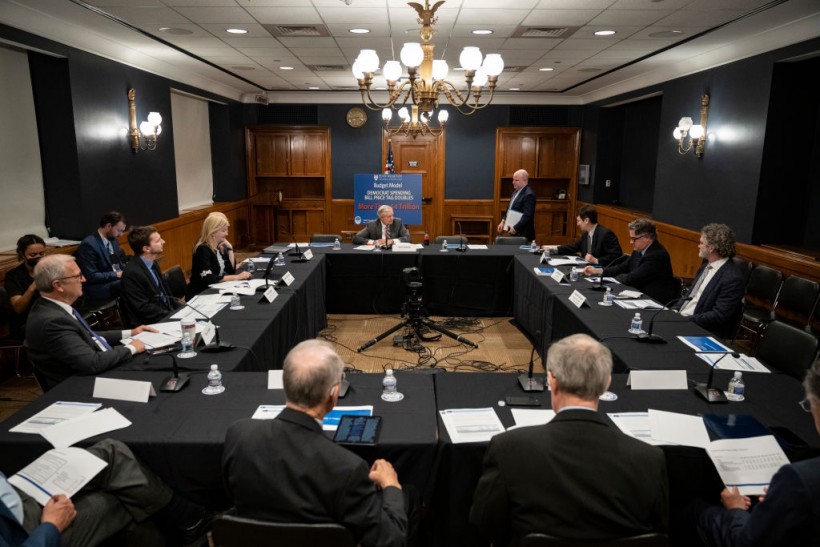
(Photo : Drew Angerer/Getty Images)
Sen. Graham Host Briefing On Democratic Spending Legislation
WASHINGTON, DC - NOVEMBER 30: At top, Sen. Lindsay Graham (R-SC) leads a roundtable discussion with Republican Senators and economists about the Democrats social policy spending bill on Capitol Hill November 30, 2021 in Washington, DC. The Senators discussed the estimated price tag and long term spending impacts of the Build Back Better legislation.
Senate Democrats are optimistic that President Joe Biden's Build Back Better program will be passed before Christmas, but one key holdout, Senator Joe Manchin, has expressed reservations about voting for a measure that incorporates big economic changes.
Many Democrats believe they will be able to reach Senate Majority Leader Chuck Schumer's deadline of December 25 for approving the package, which is vital to avoid a disruption in the monthly Child Tax Credit payments that the party views as critical to its economic and political success.
Democrats pressured over Build Back Better plan passage
Manchin, a Democrat from West Virginia, isn't so sure. Manchin said on Tuesday that he asked for a "strategic pause" on the economic package months ago, citing growing inflation and the long-term costs of the planned social and climate programs and that his position hasn't changed. In the 50-50 Senate, Manchin's vote is crucial for Democrats to enact legislation that Republicans are unlikely to embrace, Bloomberg via MSN reported.
Democrats are concerned that if the plan isn't finalized by the end of the year, it will lose steam, handing Biden and the Democratic Party a severe electoral setback heading into a congressional election year. However, Manchin isn't the only stumbling block to swift passage.
As part of the Build Back Better Act, Democrats want to keep the monthly Child Tax Credit payments to parents, but January's payment might be postponed if they don't finalize the bill before Christmas.
Democrats are committed to passing the bill before Christmas, according to Senate Majority Leader Chuck Schumer (D-N.Y.), but it will be difficult. The bill isn't ready with less than three weeks to go, and not all Democrats have stated they'll vote for it, as per HuffPost via Yahoo.
Without new legislation, the monthly Child Tax Credit payments that have been made around the 15th of each month since July will cease in 2022. Democrats are optimistic that their package will be passed, but the main question is when.
Build Back Better vote could delay Child Tax Credit payments
If they want January's payment to arrive on schedule, they can't wait until the last minute. The IRS has advised senators that the bill must be passed by December 28 to make January payments on schedule.
There's also the issue of 36 million families not knowing whether or not they'll get paid. The increased Child Tax Credit is seen by Democrats as a cornerstone of their strategy, on par with Social Security retirement benefits and not a balanced approach.
According to USA Today, when combined spending and tax expenditures are included, the Build Back Better Act is estimated to cost more than $2 trillion, according to two independent estimates. If Congress makes the bill's provisions permanent, the cost may quadruple.
The Committee for a Responsible Federal Budget, a deficit-reduction advocacy organization, estimates that the Build Back Better Act offers $2.4 trillion in spending and tax cuts through 2031, based on Congressional Budget Office ratings. The law also contains $2.3 trillion in offsets, resulting in a $160 billion budget shortfall over the same period.
The organization estimates that making all interim measures in the Build Back Better Act permanent would cost over $4.8 trillion. Similar projections have been released by the Wharton Budget Model, an economic forecasting model at the University of Pennsylvania.
According to Marc Goldwein, senior vice president and senior policy director of the Committee for a Responsible Federal Budget, the estimate represents the "highest bound of where we may wind up." And the law's cost isn't $5 trillion; it's the cost of the bill.
Related Article: Congressional Lawmakers Negotiate With Minority Leader Mitch McConnell To Lift Debt Ceiling Without Republican Votes









